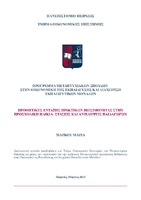Προοπτικές ένταξης πρακτικών βιωσιμότητας στην προσχολική ηλικία : στάσεις και αντιλήψεις παιδαγωγών
Perspectives for integrating sustainability practices into preschool education : attitudes and perceptions of educators

View/
Keywords
Βιώσιμη ανάπτυξη ; Βιώσιμη εκπαίδευση ; Βιώσιμη ηγεσία ; Προσχολική ηλικία ; Αειφόρο σχολείοAbstract
Perhaps the greatest challenge we face today as individuals and as societies is the sustainability of the planet. Already, after the mid-1980s, the global community has pointed out the need to take initiatives that are directly linked to environmental protection, ensuring a better quality of life, social justice, fair distribution of wealth and democracy. “Our common future” as established in the Brundtland report by the International Commission on Environment and Development (1987). Education, as is obvious, is the appropriate means to achieve the promotion of sustainable development. Through education, active citizens can be formed, who will not only participate, but also organize actions to protect the Environment and achieve the sustainability of the world that surrounds us. Preschool age is a critical period for cultivating a “sustainable” consciousness. Young children are naturally curious and open to new experiences, making them ideal for learning the importance of sustainability, cultivating basic values and adopting habits and practices towards a sustainable future.
The aim of this paper is to highlight the perceptions of preschool teachers regarding sustainable development, the actions carried out by educators in daycare centers and kindergartens to achieve sustainability, as well as the role of the director in achieving this. The specific objectives are the problems and difficulties faced by preschool teachers when designing and implementing Sustainable Education programs. This objective was implemented through quantitative research, with a methodological tool, a questionnaire, which was written specifically for the needs of this work and given to 141 preschool teachers. The findings showed that preschool teachers, being themselves aware of the environment and its problems, in the majority of them implement actions mainly of an environmental nature (recycling, environmental protection, planting), in an effort to bring children into contact with the environment, to raise awareness, to realize the major problems it faces due to human activity, so that they participate in actions for its protection. At the same time, a positive picture is observed regarding the adoption of sustainable practices by both educators and principals, but the process is still in its early stages. Their incomplete knowledge and lack of training make it difficult to transform a school into a sustainable one, so that the conditions are met at all three levels of its operation, social-organizational, economic-environmental, pedagogical. Therefore, integrated practices are required from all stakeholders and collective action to adopt the principles of sustainability.

